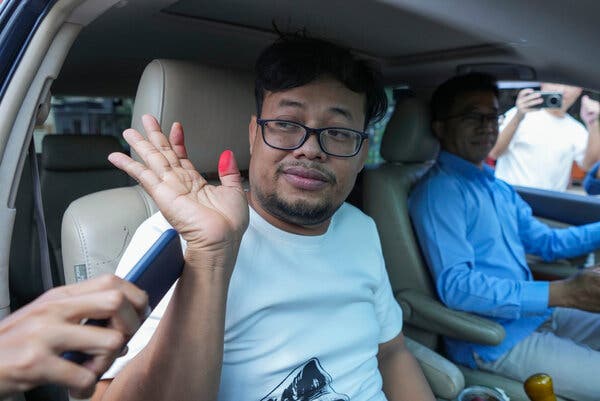Mech Dara spent three weeks in detention after he was charged for posts he made online. He still faces a charge of “incitement to provoke social chaos.”

A prominent Cambodian journalist known for his work exposing compounds in which people are forced to scam others online was released on bail on Thursday. He had been detained three weeks in a case that has been denounced by the United States and rights groups as an attack on press freedom.
The journalist, Mech Dara, told The New York Times in an interview that he still faces a charge of “incitement to provoke social chaos.” The authorities said the charge resulted from his social media posts that criticized various injustices in Cambodia. The charge carries a maximum penalty of two years in jail.
Mr. Mech Dara, 36, said he was barred from leaving Cambodia and was required to report to the police every month. “It was a very tough time for me in the prison,” he said, declining to elaborate because he is still facing a criminal charge.
On Thursday, Mr. Mech Dara’s lawyer, Duch Piseth, said he was trying to get the charge dropped.
Mr. Mech Dara is widely regarded as one of the few independent journalists left in Cambodia, and his arrest set off a firestorm of criticism against Prime Minister Hun Manet’s government.
Mr. Mech Dara has reported extensively on Cambodia’s scam compounds — where thousands of people have been lured by the promise of legitimate jobs, only to be forced under the threat of torture to cheat people online. He has documented links between them and Ly Yong Phat, a tycoon who is also a senator and a personal adviser to the prime minister. Last year, the State Department recognized Mr. Mech Dara for his work on unearthing human trafficking.
His release came a day after Cambodia’s information minister shared a video of the journalist apologizing for his social media posts as well as images of a handwritten three-page letter addressed to Prime Minister Hun Manet, and his father, Cambodia’s longtime leader, Hun Sen.
“In all the messages that I posted, I conveyed false information that affected the leaders and the country’s reputation,” Mr. Mech Dara said in the video. “I sincerely apologize for my mistakes and promise to stop sharing such harmful content.”
On Wednesday, Samantha Power, the administrator of the United States Agency for International Development, told reporters in Phnom Penh, Cambodia’s capital, that the U.S. government had been following Mr. Mech Dara’s case closely. Ms. Power said she had raised the issue with the prime minister.
After his release from a prison in Kandal Province, Mr. Mech Dara headed to a pagoda for a blessing. He poured water on a Buddha statue and ate prahok, a dish of fermented fish.
“I would like to thank everyone who jointly helped me to get this bail release,” he said.
Sui-Lee Wee is the Southeast Asia bureau chief for The Times, overseeing coverage of 11 countries in the region. More about Sui-Lee Wee